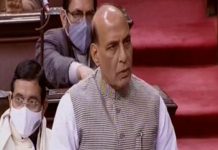 Actor Saif Ali Khan has not been having a good run at the movies in recent times. He has delivered winsome performances in Kalakaandi and Chef, but neither film did well. But Saif’s brooding, bearded face, beaming down from hoardings across Indian cities has piqued curiosity. In Sacred Games, the first of its kind big ticket Indian web series, he plays inspector Sartaj Singh, a book character that has been waiting in hardbound for over a decade for a gripping screen adaptation. Co-shouldering this project is Nawazuddin Siddiqui, one of the finest actors and an Indian face recognised amongst international film folk for offbeat performances. Radhika Apte plays an important part. Recognised faces from cinema like Neeraj Kabi, Aamir Bashir, Surveen Chawla and Geetanjali Thapa play key parts in the modern day epic saga. Speaking at the press conference to announce this project, Saif explained his excitement about leading a Netflix series, “I am really hoping that we will be completely free to expose and express ourselves. It’s both challenging and daunting and we have no reason to not deliver something that stands up to international quality.”
Actor Saif Ali Khan has not been having a good run at the movies in recent times. He has delivered winsome performances in Kalakaandi and Chef, but neither film did well. But Saif’s brooding, bearded face, beaming down from hoardings across Indian cities has piqued curiosity. In Sacred Games, the first of its kind big ticket Indian web series, he plays inspector Sartaj Singh, a book character that has been waiting in hardbound for over a decade for a gripping screen adaptation. Co-shouldering this project is Nawazuddin Siddiqui, one of the finest actors and an Indian face recognised amongst international film folk for offbeat performances. Radhika Apte plays an important part. Recognised faces from cinema like Neeraj Kabi, Aamir Bashir, Surveen Chawla and Geetanjali Thapa play key parts in the modern day epic saga. Speaking at the press conference to announce this project, Saif explained his excitement about leading a Netflix series, “I am really hoping that we will be completely free to expose and express ourselves. It’s both challenging and daunting and we have no reason to not deliver something that stands up to international quality.”
Sacred Games brings recognised names from the Indian film industry. Vikramaditya Motwane is the show runner and executive producer and co-director, along with Anurag Kashyap who is the director of this series. Produced under their banner, Phantom Films, the visually rich and massive book by Vikram Chandra is being adapted for screen by National Film Award winning writer Varun Grover, and his colleagues Smita Singh and Vasant Nath. While launching the series, Vikram Chandra explained his role in the screen adaptation as, “I was a kind of consultant on adapting the book. Varun Grover, Vasant Nath and Smita Singh have been an absolute pleasure to work with; they have reimagined my book and world is exciting.”
Upon watching the series, as the author has successfully completed four episodes, one notices that Phantom Films and the show’s creative team has upheld global standards in visual story telling and treatment. One also notices the high-impact background score (by Alokananda Dasgupta and Rachita Arora) knitted with the series narrative, in sync with international programs. With a cast top lined by a Bollywood star and worthy talent from cinema, Sacred Games heralds a potentially permanent change in Indian cinema.
Like previous Netflix original shows House of Cards, The Medici, Narcos, Stranger Things and the game changing series, The Crown, this series utilises solid Indian screenwriting, directing and acting talent on long format. It also offers them an international platform to screen like no other. It brings a creative outlet for stars and actors beyond commercial cinema, a space that Saif Ali Khan and Nawazuddin Siddiqui clearly blossom in. Netflix streams in 190 countries worldwide. Unlike the pressures of a film releasing, Sacred Games will remain on Netflix for eternity, giving viewers across the globe a chance to watch it whenever they like. Watching the show is pleasurable also because its screen writers have adapted it to contemporary Mumbai reality effortlessly. Written over a decade ago, Vikram Chandra’s book was anticipated to become a best seller that makes money. It didn’t become a huge success. Even so, Chandra’s merging of the Mumbai underworld with communal politics, the Babri Masjid demolition and Indian intelligence operations across South Asia was an intoxicating brew that has grown a cult following among readers. Grover, Singh and Nath have adapted his world to the ISIS and Al-Qaeda threat, the underbelly of communal tensions marking Mumbai’s slums and poor neighborhoods and an era where cellphones get tracked and GPS is used extensively by the police and RAW.
Sacred Games is the most high profile Netflix original to launch from India but it’s not the first. Ronnie Screwvala has returned to producing films with RSVP and his company delivered the first Netflix original film with Love Per Square Foot earlier this year. Starring Vicky Kaushal, Angira Dhar and top-notch actors, this romantic comedy did very well because of its universally appealing story about urban housing and typical Indian treatment. Similarly, the edgy Brahman Naman, not a film for everyone but one with cult potential, was acquired by the streaming giant in 2016 and found success worldwide.
Streaming brings a world of opportunity for filmmakers and actors from India. The long format gives a chance for stories to grow, flourish and develop over time. It leads to experimentation and freedom in exploring unconventional methods of storytelling. Hollywood stars like Robin Wright, Dustin Hoffman, Nicole Kidman, Winona Ryder and others have moved to shows on streaming platforms and TV in recent times. Creatively these are satisfying outlets and in terms of reach, their expanse goes beyond Hollywood. As Vikramaditya Motwane, executive producer and co-director of Sacred Games said, “We are getting more excited by the longer format. The option of telling stories about characters for more than two hours and for over seasons, is so exciting. It’s also very new.”
Amazon Prime has also actively acquired and streamed original Indian content successfully, gaining an edge over Netflix. With two original shows Breathe starring R Madhavan and Inside Edge starring Vivek Oberoi, Richa Chaddha, etc. Prime has focused on more Hindi titles and content. They have acquired leading Hindi films in the last couple of years and have committed 300 million USD to backing original Indian content. Strategically, Amazon Prime has a different approach of price sensitivity and larger numbers whereas Netflix aims at urban 18 to 35 audiences with global tastes and building loyalties. Prime might have added numbers but their TV shows have not made the same impact as Netflix’s Sacred Games. Between both, Indian creative talent has more opportunities to create and explore better, more interesting homegrown stories.
Always more cutting edge and progressive than Hindi cinema, South Indian cinema has worked out an advantage on Netflix. Most regional language content on the platform is acquired like the Baahubali films. Recent Tamil films include originals like Priyadarshan’s Sila Samayangalil (Sometimes), Kalki, Revelations and the acclaimed festival favorite, Radiopetti. With Sacred Games, Hindi cinema makes a promising new beginning with an innovative creative format.
Streaming online has immense potential in India as busy work schedules and changing tastes reduce the appeal of appointment viewing on television. With original Indian content matching up to global standards in storytelling, like Sacred Games achieves, this brings a chance to upgrade quality and access more audiences across the world for Indian filmmakers, writers and cinematic talent. Question now remains whether Indian cinema can take advantage of this opportunity and turn a corner for the better.












